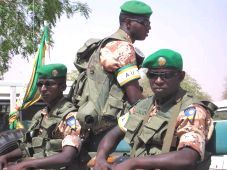UN envoy says 8,000 peacekeepers may be needed in Darfur
By MOHAMED OSMAN, Associated Press Writer
KHARTOUM, Sudan, Mar 17, 2005 (AP) — A force of 8,000 peacekeepers is needed in Darfur for the nearly 2 million people displaced from the western part of Sudan to feel safe enough to return home, the chief U.N. envoy to Sudan said Thursday.

|
|
Rwandan soldiers guard the funeral of a man killed by Janjaweed in Al Fasher, North Darfur State March 1, 2005.(Reuters). |
Separately, the World Food Program has warned that more than 5 million people may run short of food in Sudan this year because of poor harvests.
U.N. envoy Jan Pronk held talks Thursday with members of a United Nations and African Union team who toured Darfur last week to assess the security situation of the region, which has been wracked by a rebellion and a counter-insurgency campaign that has drawn international condemnation. The mission’s findings are to be presented to the United Nations and the African Union.
“I have made it very clear to the mission that we need a robust force, I mean 8,000 military, for a duration of about four years … so that people can return to their areas,” Pronk told a news conference afterward.
Pronk said he expected that 1.8 million people would begin to go home once a peace agreement was reached, and they would need protection.
He said he was hopeful that peace could be secured by the end of this year.
The AU has currently some 2,200 soldiers and cease-fire monitors in Darfur, although it was scheduled to deploy 3,400 personnel in the region. U.N. Secretary-General Kofi Annan has said it is possible that U.N. peacekeepers could complement the AU troops.
Pronk said he expected continued trouble from the bandits and militias, including the pro-government Janjaweed. Last week, bandits and Janjaweed militiamen stole dozens of trucks belonging to the United Nations and NGOs.
He praised the Sudanese government for securing the return of the trucks, saying it “finally did what the United Nations had requested it to do a long time ago.”
The Darfur conflict began in February 2003 when two groups of African ethnic origin took up arms against the Arab-dominated government to win more political and economic rights for the region’s African tribes.
Sudan’s government is accused of responding by sponsoring Janjaweed militiamen who waged a campaign against Sudanese of African origin, burning down their villages, raping women and killing people. The government denies backing the Janjaweed.
Pronk said the United Nations and some NGOs had to withdraw staff from parts of Darfur last week because of threatened attacks by bandits and militias. However, the withdrawals did not affect the humanitarian operations, he said.
In Rome, the Sudan director for the U.N. World Food Program, Ramiro Lopes da Silva, said a serious shortage of food was looming in parts of the country because of harvests had failed due to inadequate rain and staple commodities were selling at high prices.
“We are dispatching assessment teams to the worst-hit areas to find out by mid April how many more people need food aid in the months ahead,” da Silva said Thursday.
“So far, WFP doesn’t have enough food to provide for the 5.5 million people who need assistance in 2005 in some areas … If the numbers continue to rise, Sudan will face a new catastrophe unless more food gets here fast,” he said.
